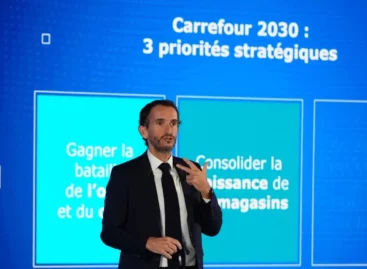Dimensional change in banking: AI-based banks are coming
The next major transformation of the banking sector can be brought about by generative and agentic artificial intelligence (AI) technologies, emphasized Éva Hegedüs, President and CEO of Gránit Bank, at the Portfolio Future of Finance event. In addition to digitization, domestic and international banks have taken advantage of the opportunities provided by artificial intelligence in recent years, and Gránit Bank is also at the forefront of this. The bank develops its solutions based on Open AI’s large language models and Intuitech’s agentic AI-based framework, which it has been working on for a year and a half.

Éva Hegedüs highlighted Gránit Bank’s agentic AI solution, Gránit Guru, which acts as a virtual clerk and provides personalized banking services for customers 24 hours a day. The system not only helps to serve customers, but also increases the internal efficiency of the bank, with significant automation capabilities. Gránit Guru automates 80-90% of banking workflows, which is twice the 30-40% automation achieved through previous digitization. This results in faster administration and more cost-effective operation.
Hegedüs emphasized that although AI is bringing significant change to the banking sector, traditional banking tools and values – such as capital, transparency and trust – are still key to growth.
Generative and agentic AI technologies are revolutionizing the financial sector, and McKinsey estimates that these new solutions could generate $200-340 billion in benefits for the global banking sector annually, representing 9-15% of bank profits. The interest in AI is also significant in Hungary, according to the MNB’s survey, 91 percent of domestic banks deal with the development and mapping of artificial intelligence-based solutions.
AI-based technologies are therefore not only a challenge, but also a huge opportunity for the banking sector, which will be shaped by artificial intelligence in the next decade.
Related news
This is what used to be the case with personal loans: single-digit interest rates were available at every bank
🎧 Hallgasd a cikket: Lejátszás Szünet Folytatás Leállítás Nyelv: Auto…
Read more >More international star speakers and AI video competition at WAVES
🎧 Hallgasd a cikket: Lejátszás Szünet Folytatás Leállítás Nyelv: Auto…
Read more >Carrefour Unveils 2030 Strategy, To Focus On France, Spain And Brazil
🎧 Hallgasd a cikket: Lejátszás Szünet Folytatás Leállítás Nyelv: Auto…
Read more >Related news
GDP growth in OECD member countries slowed to 0.3 percent in the last quarter of last year
🎧 Hallgasd a cikket: Lejátszás Szünet Folytatás Leállítás Nyelv: Auto…
Read more >Change in Rossmann Hungary’s leadership: Kornél Németh decided to move towards new challenges in 2026
🎧 Hallgasd a cikket: Lejátszás Szünet Folytatás Leállítás Nyelv: Auto…
Read more >







